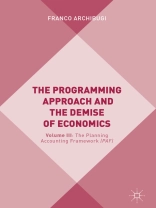This trilogy deals with an epistemology of economics, arguing for a radical overturning of conventional analysis and providing an alternative to political economy and social sciences, based not on positivism, but on a normative and programming paradigm.
Volume III furthers and concludes work presented in Volume I and Volume II, and introduces a concrete and practical example of how to build a Planning Accounting Framework (PAF), as associated with Frisch’s ‘plan-frame’ (explored in Volume II), to demonstrate the extent to which decisions and negotiations can be routed in the social sciences. The PAF is an instrument of the programming approach that can be used to verify the compatibility of decisions and their effects. The author builds on Frisch’s classical PAF to maximise the phenomenology of economic systems, and assure a consistent and effective implementation of decision making.
قائمة المحتويات
1. The ‘Planning Accounting Frame’(PAF), as an instrument of the ‘programming approach’.- 2. The spatial dimension of the Planning Accounting Framework.- 3. A ‘System of models’ for the PAF elaboration.- 4. The political and practical use of the PAF.- 5. Conclusive considerations.
عن المؤلف
Professor Franco Archibugi is the Founder and Chairman of the Planning Studies Centre in Rome, Italy. Prior to this he taught economics at the University of Florence, Italy and planning at the Universities of Calabria, Palermo, and Naples, Italy. He studied history and philosophy at the Universities of Rome and Heidelberg, and economics at the London School of Economics. He is the author of many books and papers on socio-economic, environmental and urban planning published in Italian, English and other languages.












